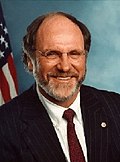November 7, 2000 | |||||||||||||||||
| Turnout | 70% [1] ( | ||||||||||||||||
|---|---|---|---|---|---|---|---|---|---|---|---|---|---|---|---|---|---|
| |||||||||||||||||
Corzine: 40-50% 50–60% 60–70% 70–80% 80–90% Franks: 40-50% 50–60% 60–70% | |||||||||||||||||
| |||||||||||||||||
| Elections in New Jersey |
|---|
 |
The 2000 United States Senate election in New Jersey was held on November 7, 2000. Incumbent Democratic U.S. Senator Frank Lautenberg retired rather than seeking a fourth term. Democratic nominee Jon Corzine, former CEO of Goldman Sachs, defeated the Republican U.S. Representative Bob Franks in a close election.
Contents
- Background
- Hypothetical polling with Frank Lautenberg
- Hypothetical polling with Christine Whitman
- Democratic primary
- Candidates
- Campaign
- Polling
- Endorsements
- Results
- Republican primary
- Candidates 2
- Polling 2
- Results 2
- General election
- Candidates 3
- Campaign 2
- Debates
- Polling 3
- Results 3
- See also
- Notes
- References
- External links
For most of the prior years, the election was expected to pit the incumbent, Lautenberg, against popular Republican governor Christine Todd Whitman. Lautenberg unexpectedly announced his retirement from the Senate in February 1999, leaving the race open. Whitman announced in April that she would form a campaign committee to enter the race in earnest; however, she stunned political observers in September 1999 by announcing that she would withdraw from the race, citing fundraising concerns.
Primary elections were held on June 7. Corzine defeated former Governor Jim Florio in the Democratic primary by a wide margin after a hard-fought campaign in which Corzine spent over $35 million of his own money. Franks narrowly defeated State Senator William Gormley to capture the Republican nomination.
In the general election, Corzine continued to spend freely to advertise his campaign and establish political support. Ultimately, he defeated Franks by approximately three percent of the total vote.






